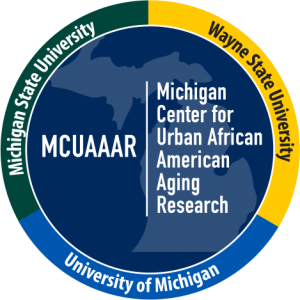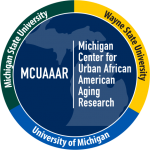
Michigan Center for Urban African American Aging Research
Mentoring
There is a severe shortage of ethnic minorities at all levels of the biomedical workforce. African Americans, Latinos, and Native Americans have lower likelihoods of entering and completing college, graduate school, and professional schools. In addition, ethnic minority faculty members in the social and biomedical sciences are less likely to receive tenure or move to higher academic ranks. One of the issues identified in the literature that may substantially facilitate diversifying the academic and biomedical workforce is mentoring. Numerous studies in STEM disciplines and the broader social sciences have identified the importance of mentoring. Research has shown that regardless of race, individuals who receive high-quality mentoring have significantly greater odds of being successful, as measured by material outcomes that include graduating from college, completing graduate or professional training, obtaining prestigious jobs, and achieving tenure. Unfortunately, it has also been well documented that African Americans and other ethnic and racial minorities are less likely to receive mentoring and are more likely to be socially and professionally isolated from mentoring networks.
The traditional model of mentoring relies on a one-on-one approach, in which a senior scholar coaches a graduate student from early coursework through graduation and perhaps junior investigator status. In contrast, MCUAAAR has developed a structured mentoring and education process for our research scientists, which includes an individualized development plan, monthly integrative and individual mentoring sessions, and an educational series in research fundamentals and health disparities. Our mentoring approach is enhanced through the integration of the Research Education Core with the Administrative, Community Liaison and Outreach, and Analysis Cores. The MCUAAAR faculty have developed a proven strategy to successfully mentor junior researcher scientists, and the MCUAAR faculty are active major researchers in the field of African American life-course development and aging.
As an example of the effectiveness of this approach, during the 2012-17 period, MCUAAR junior researcher scientists published 232 articles (an average of more than three per year per researcher) and obtained 77 internal and external research grants.
What I Learned on the Academic Job Market
February 17, 2023
Dr. Janelle R. Goodwill, Assistant Professor at the University of Chicago Crown Family School of Social Work, Policy, and Practice, shared insights she learned while on the academic job market. Her talk focuses on negotiation strategies once you receive a job offer or multiple job offers.
